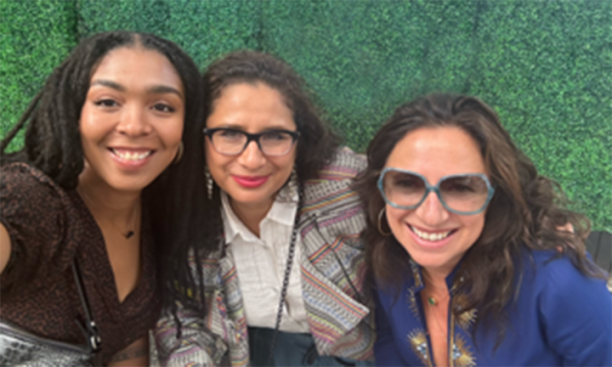
Delphine Hirsh ’92 found her current unusual career thanks to a Google search.
“I had some experiences that led me to want to see if there was anything better out there than the disposable period products that I was used to using, so I Googled ‘better period product,’” she said. “I saw there was something called the menstrual cup, which I’d never heard of.”
To save another Google search: unlike tampons or pads, which absorb menstrual fluid, a menstrual cup is a small, flexible cup that can be inserted into a vagina to collect menstrual fluid. It can be used for up to 12 hours at a time, and can be easily cleaned and reused for up to ten years.
Later on, after successfully trying a cup she had purchased from a feminist bookstore, Hirsh said she felt upset that she hadn’t learned about it sooner. “I grew up in New York City, my mom marched with Gloria Steinem, I went to a really progressive school, and I was like, ‘Wait, the world has been keeping this information from me,’” she said.
Cups are now more widely available, but the National Institutes of Health reported in a 2023 study that only about 17% of participants had used a cup during their last period. According to Hirsh, a woman can save between $4,000-8,000 over the course of her lifetime by purchasing a cup instead of disposable period products, though she added that even that range could be on the “low end.” She quickly saw the cup as a tool to fight period poverty, a term used to describe the global lack of access to and education about proper menstrual products.
“I was immediately struck by what a powerful application it could have for less resourced folks,” Hirsh said. “I kind of made it my mission — which is an ambitious and never-ending mission — to make sure that people who have the greatest need for menstrual cups have information about them and access to them at no cost.”
In 2017, she founded The Flow World to address that mission. Hirsh said she believes its the only nonprofit in California, and perhaps the U.S., to focus exclusively on a reusable menstrual product. Her team works with about 55 partner organizations that serve less resourced communities to distribute donated cups and provide education and training.
Since its founding, The Flow has distributed about 8,000 cups, and the team is poised to distribute about 6,000 cups this year alone. “We have been facing an explosion in interest,” Hirsh said, noting that she’s currently pursuing grants and other sources of funding.
One new project Hirsh is particularly excited to secure funding for is a collaboration with the women’s farmworkers association Alianza Nacional de Campesinas to donate cups and provide peer-to-peer education to hundreds of female farmworkers across 10 states. Hirsh said it’s the first campaign of its kind in the U.S. to use cups to fight period poverty in an organizational way, and The Flow will be able to collect feedback from the participants to inform its work in the future.
“There has been more interest in period poverty in the last decade, and there’s even some potential federal legislation, but I still think that there’s not enough visibility for cups,” Hirsh said. “You have to really be in it, taking down those barriers.”
